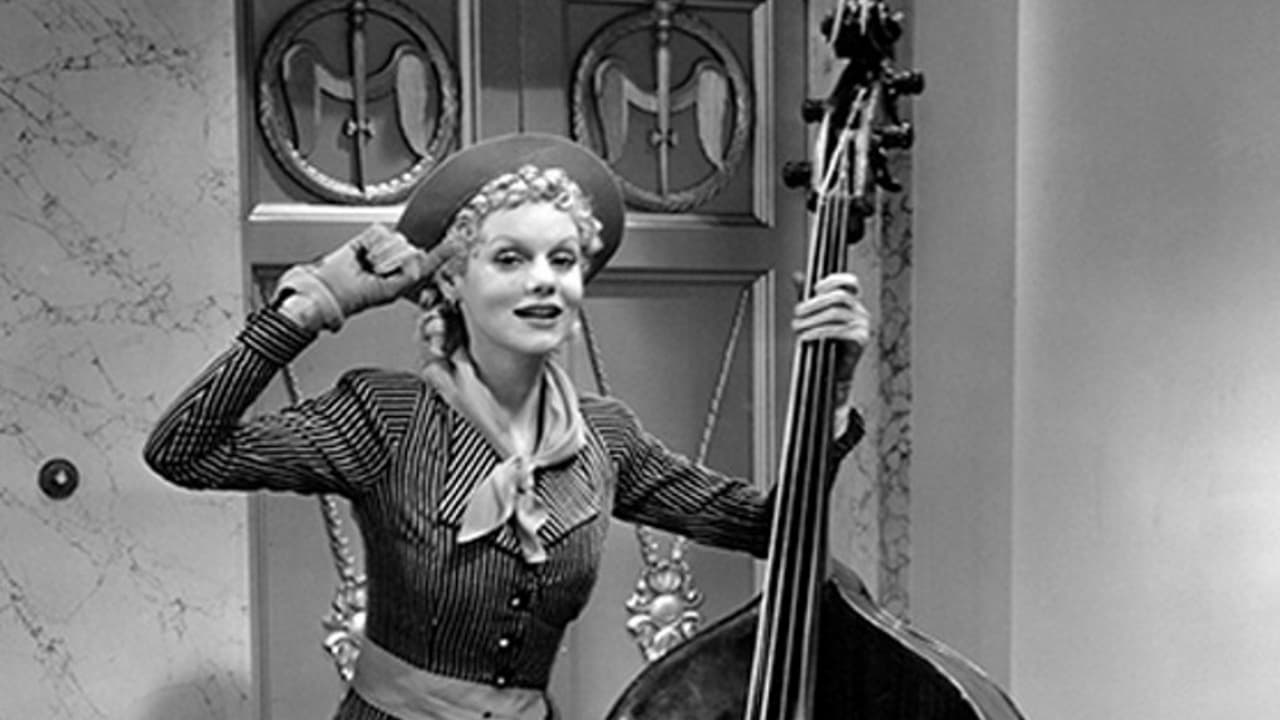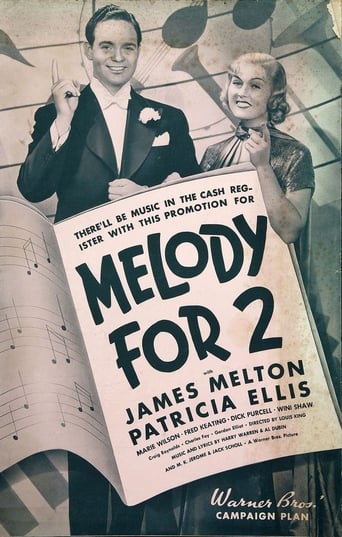Interesteg
What makes it different from others?
AniInterview
Sorry, this movie sucks
Softwing
Most undeservingly overhyped movie of all time??
Phonearl
Good start, but then it gets ruined
atlasmb
"Melody for Two" is a musical--one of those musicals common to its time, where the story takes place on a stage or in a nightclub as an excuse to present musical numbers that have little, if anything, to do with the plot. In this film, the primary characters all work in or around nightclubs. The big "drama" in the story comes from the "novel" idea of introducing swing music to the nightclub patrons. Is it a passing fad? Will audiences like it as much as they do in Harlem clubs? There is a minimum of romance, and who carries a torch for whom has little to do with the action. What the viewer is left with is a collection of musical performances which, in this case, are an assortment of mediocre tunes and the occasional hummable melody. The dialogue is meant to be the snappy banter that typifies the thirties and successfully punctuated the successes of Ginger Rogers, Jean Arthur, Cary Grant, and many others. But the banter is uninspired and it feels forced and wooden as delivered by this troupe. The worst is Charley Foy (yes, one of those Foys) who plays a hoofer named Scoop (natch). Foy is the comic whose job is to insert clever one-liners throughout his scenes, but his jokes are lame and they destroy the rhythm of the dialogue.The fashions in this film are horrible and make one truly appreciate other films of the time that celebrated beauty, ingenuity and the female form.It is interesting to hear the characters argue over the consequence of swing music as many in the 1950s argued about rock and roll and those at the turn of the century discussed hip hop. Swing enjoyed a heyday during the big band era and enjoys success today, if primarily as part of the swing dancing phenomenon. Swing always had what many now refer to as "swag".All in all, "Melody for Two" is a shadow of what it could have been with better talent and, perhaps, a bigger budget.
lugonian
MELODY FOR TWO (Warner Brothers, 1937), directed by Louis King, is a 60 minute musical programmer starring James Melton in his third and final leading role for the studio. Following STARS OVER Broadway (1935) and SING ME A LOVE SONG (1936). Melton, an accomplished opera singer, was one of those talents who failed to register as a screen personality. After the release of MELODY FOR TWO, it was three strikes and out. Melton plays Tod Weaver, a band-leader working at the Sky Terrace, "America's most exclusive club" of New York City. Gale Starr (Patricia Ellis), his girlfriend, performs as the band's vocalist. Because his contract arrangement has run out two months ago and not been renewed, Mel Lynch (Dick Purcell), Tod's arranger whose real interest is Gale, insists on a new contract of $500 a week and a bonus of $1,000. Tod refuses and has Mel fired. William Hallam (Craig Reynolds), the night club manager, unhappy with that decision, feels his club could face financial ruin. Gale's idea is to have Hallam pay Tod the $1,000 himself to give Mel for his musical arrangements. When Tod learns of this after reading Walter Wilson's (Gordon Elliott) newspaper column, he walks out on his contract, ending up being suspended by the National Band Association, with Gale assuming Tod's role as band-leader. "Remorse" Rumson (Fred Keaton), publicity man, assisted by "Scoop" Rumson (Charley Foy), press agent and former hoofer, arranges for Tod's comeback by having him lead the band at the Green Mill, with Lorna Gray (Winifred Shaw) as new singer with Camille Casey (Marie Wilson), Rumson's girl from Hoboken, playing the bass. Because their music has failed to pack the house, it takes Exodus Johnson (Eddie Anderson), a janitor from Harlem, to improve their method by introducing them to something called "swing" music that he's written. With Lorna now singing "hot," the swing music proves very profitable for the French accented Alex Montrose (Eddie Kane), manager of the Green Mill, attracting more patrons than the Sky Club, having Tod and Gale compete against each other and issues upon their auditioning for an upcoming radio show. For the motion picture soundtrack, new songs by M.K.Jerome and Jack Schroll include: "A Flat in Manhattan" (sung by Patricia Ellis); "Melody for Two" and "Macushola" (both sung by James Melton); "Dangerous Rhythm" and "An Excuse for Dancing" (both sung by Winifred Shaw); "September in the Rain" (by Harry Warren and Al Dubin, sung by Melton); "Jose O'Neil, the Cuban Heal" (sung by Winifred Shaw); "An Excuse for Dancing" (sung by Patricia Ellis); and "Melody for Two" (Sung by Melton).The songs in MELODY FOR TWO are as forgettable as the story itself, with production looking more like a product from Republic Studios or even Grand National than Warner Brothers. Winifred Shaw, in her final screen role, whose introduction to such great tunes as "Lullaby of Broadway" and "The Lady in Red" from 1935's GOLD DIGGERS OF 1935 and IN CALIENTE respectively, sings nothing worth noting this time around. Due to tight editing, Shaw's role, along with several others in support, happens to be one of those come and go type performances. She's initially seen singing in the band towards the second half of the story, with no introduction to her character whatsoever. She disappears as quickly as she came. Her only noteworthy scene in the story department comes as she attempts to attract the attention of her band-leader boss (Melton) with a seductive kiss, to immediately slap his face for reasons only known to her and not the viewer. Shaw sings three melodies here, taking the spotlight in Spanish attire to "Jose O'Neil, the Cuban Heal," and at one point, reflects upon a young Ethel Merman. Patricia Ellis is basically a more sensible character as opposed to Melton's stubbornness. Her brief scene as the camera captures her leading waving the stick leading the band is reminiscent to Ina Ray Hutton, one of the relatively few female band-leader's of that time. For her second role opposite Melton, Ellis sings a little but carries the plot such as it is with ideas as to how to improve herself and the band's performance. Melton's only worthwhile song is "September in the Rain," originally written for his debut film "Stars Over Broadway," is one of the few high-points next to Eddie Anderson, the future "Rochester" of the Jack Benny radio and TV programs, using his "Excuse for Dancing" at one point. Supposedly reported as Donald O'Connor's film debut, he's non-existent in the final print. MELODY FOR TWO makes no high demands on acting and storytelling, but no harm done either way for classic movie fans whenever this rarely seen Warner Brothers musical turns up on Turner Classic Movies.(**)
fubared1
Even if you like musicals (and I do), don't bother with this bit of tripe. Suffice it to say, it's short, and that's about the only thing to recommend it. The acting is horrendous, the singing, highly mediocre, and the music itself is especially abysmal tripe, with nary a hummable tune in sight (just a lot of forgettable schlock). Add to this all the dull direction and production and this comes out as a total waste of time, albeit a short time. I gather the leading man went on to become an opera star. Well, he's certainly ugly, fat, and totally lacking in any acting talent, so I'm not surprised he did. 99% of all opera singers can't act and he is no exception. And Warren and Dubin must have been scraping the bottom of the barrel for the music delivered here. Though never the caliber of a Berlin, Gershwin, Arlen, etc., they did write a few memorable tunes, but you won't find any of them here.
bkoganbing
In the barely one hour running time of Melody for Two a whole lot of musical numbers gets packed into it. So much so that unfortunately a lot of plot gets sacrificed. When I saw that Donald O'Connor was supposed to be in Melody for Two it confirmed my suspicions that a lot got left on the cutting room floor. Who knows if O'Connor had actually appeared in Melody for Two and had gone to Warner Brothers how much different a career path he might have had.James Melton and Patricia Ellis lead rival bands. In fact when the film starts out she's the female vocalist in his band. But when he gets into a stupid fight with his arranger and quits the club he's contracted for, she steps in and takes over the band.Not to be outdone Melton goes out and hires himself an all female orchestra. Both of them get into the latest of crazes, swing music and turn professional rivals.Right after this Melton left Warner Brothers and went on to grand opera and eventually became the lead tenor at the New York Metropolitan Opera in the Forties. But in this final Warner Brothers film, he introduced and popularized the song, September in the Rain.Harry Warren and Al Dubin had originally written this for Melton's first Warner Brothers film, Stars Over Broadway, but it was cut, though you can hear it in the background. In Melody for Two Melton got to sing it and it became a big hit in 1937, one of Warren and Dubin's biggest. Melody for Two is good easy to take entertainment. Look for Wini Shaw to also have a good number or two in it and Marie Wilson as the seemingly dumb bass fiddle player who comes up with the two ideas that change some personal history.

